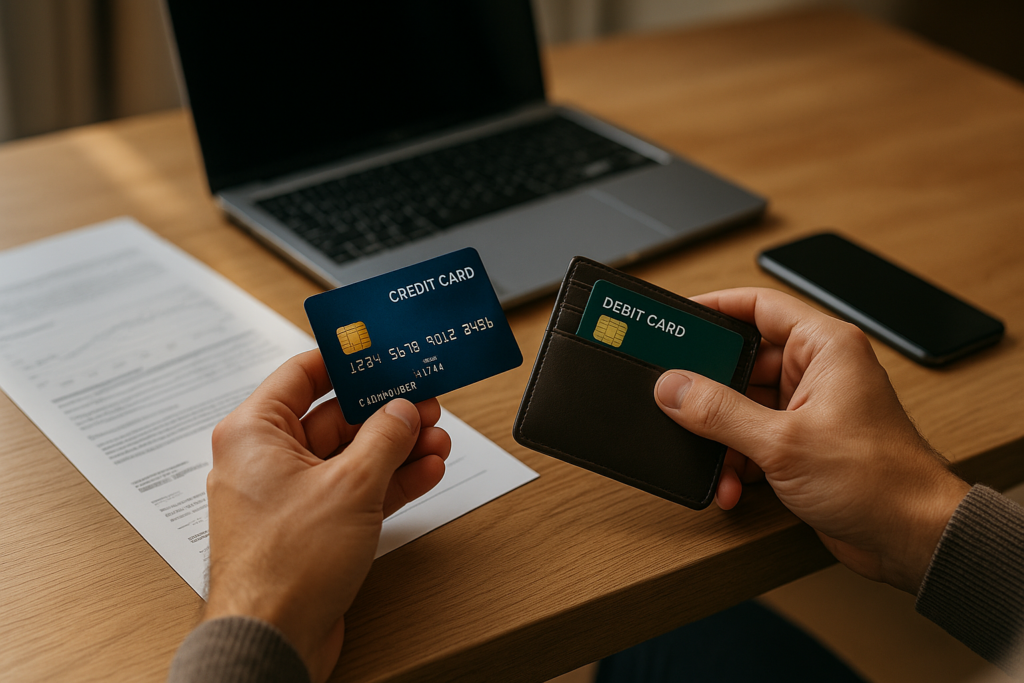When it comes to managing your money, most people use either a debit card or a credit card. Both are convenient payment tools, but they serve different purposes and come with distinct advantages and disadvantages. Understanding the differences can help you make better choices, avoid debt traps, and optimize your financial benefits.
Introduction
In today’s digital world, having a debit or credit card is almost mandatory. They provide easy access to your funds, enable online shopping, and often come with rewards or cashback offers. But which one should you opt for? Or should you use both? This guide explores the key differences between debit and credit cards, their usage, benefits, risks, and what to consider before applying for either. Being informed helps you select the best card suited to your financial goals and lifestyle.
What is a Debit Card?
A debit card links directly to your savings or current account. When you make a purchase, money is deducted immediately from your account. Think of it as using cash, but in a digital form. Debit cards are issued by banks and financial institutions and are widely accepted for physical and online transactions.
Advantages of Debit Cards
- Ease of Access: You can use it at ATMs or POS terminals.
- No Debt: Spending is limited to your available balance.
- Lower or No Fees: Generally, debit cards have fewer fees compared to credit cards.
- Better Budget Control: Since you spend only what you have, helps in avoiding debt.
Disadvantages of Debit Cards
- No Credit Building: Debit usage does not improve your credit score.
- Limited Fraud Protection: Though protections have improved, disputing unauthorized transactions can be more cumbersome.
- Fewer Rewards: Most debit cards offer basic cashback or rewards, but they are usually less lucrative.
What is a Credit Card?
A credit card allows you to borrow money up to a pre-approved limit. When you swipe your card, the bank pays the merchant on your behalf. You then repay the amount either in full or in installments, often with interest if carried over. Credit cards are useful for building credit history and accessing various benefits.
Advantages of Credit Cards
- Build Credit Score: Responsible use improves your credit score.
- Rewards and Offers: Cashbacks, travel rewards, discounts, and other perks are often available.
- Enhanced Fraud Protection: Better dispute resolution processes.
- Emergency Funds: Provides financial flexibility in urgent situations.
Disadvantages of Credit Cards
- Debt Risk: Overspending can lead to high-interest debt.
- Interest Charges: Carrying balances results in accruing interest, increasing the cost of purchases.
- Fees: Annual fees, late payment fees, and other charges are common.
Key Differences Summary
| Aspect | Debit Card | Credit Card |
|---|---|---|
| Source of Funds | Linked to your bank account | Borrowed money up to credit limit |
| Impact on Credit Score | Does not affect | Improves with responsible use |
| Spending Limit | Available balance in account | Pre-approved credit limit |
| Growth of Debt | None | Possible if not paid in full |
| Rewards & Benefits | Typically minimal | Cashback, reward points, discounts |
| Fraud Protection | Limited | Strong, with dispute mechanisms |
Using Both Cards Wisely
Many individuals prefer using both depending on the scenario. Use a debit card for daily expenses and budget control. Rely on a credit card for larger purchases, travel, or earning rewards. Just ensure to pay your credit card bills responsibly to avoid debt accumulation and to build a healthy credit profile.
What to Consider Before Applying
Before applying for either card, ask yourself:
- What are my spending habits?
- Do I want to build credit or maintain control over my expenses?
- Am I comfortable with the risk of debt?
- What benefits do I want—cashback, rewards, travel perks?
- What fees or charges am I willing to pay?
Compare credit cards carefully, looking at interest rates, annual fees, rewards, and customer reviews. The right choice depends on your financial goals and lifestyle.
FAQs
1. Is it safe to use a debit card online?
Yes, but ensure you use secure websites and prevent phishing scams. Additionally, consider using virtual cards or two-factor authentication for extra security.
2. Can I build my credit score with a debit card?
No, debit card usage does not impact your credit score directly. To build credit, responsible credit card use is necessary.
3. What happens if I overspend on my credit card?
If you overspend and cannot pay the full bill, you’ll incur interest charges. Late payments can also harm your credit score and lead to additional fees.
4. Should I have both a debit and a credit card?
Yes, having both allows flexibility—you can control spending with a debit card and enjoy rewards and credit-building benefits with a credit card.
5. How do I choose the best credit card for me?
Compare credit cards based on rewards, fees, interest rates, and benefits. Use tools like Find My Card to help identify options suited for your needs.
Final Words
Both debit and credit cards are essential financial tools with unique advantages. Understanding their differences helps you manage your finances better, avoid pitfalls, and maximize benefits. Before applying, assess your spending habits, financial goals, and comfort with debt. This way, you can select the best cards that support your financial journey.
Need help comparing credit cards or understanding their benefits? Visit FinWitty for expert reviews and latest offers. Take control of your financial future today!

